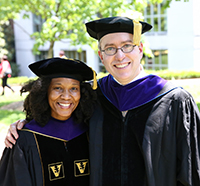Monique Hannam was already an attorney when she entered Vanderbilt Law School. A native of Jamaica, Hannam had worked in the Attorney General’s Chambers in Kingston as an Assistant Crown Council after earning her law degree at the University of the West Indies and becoming a member of the Jamaican Bar.
But when Hannam married and moved to North Carolina with her husband, Paul, a prior Navy Hospital Corpsman, she realized she would need to earn an American law degree to practice in North Carolina. “Jamaica has a common law system, but it’s more like the British system,” she explained. Attorneys earn undergraduate law degrees and then attend schools that provide procedural training and a path to bar admission.
After moving to the U.S., Hannam volunteered with Legal Aid of North Carolina, where she received the 2009 Volunteer Law Clerk Award. “That was very fulfilling, but I was not actually working as a lawyer,” she said. She also clerked for two years as a law clerk for S. Wayne Patterson & Associates, an immigration law firm. When the Hannams moved to Nashville in 2011 so Paul could start medical school at Meharry Medical College, Monique began preparing to take the LSAT.
 Vanderbilt was the only law school to which Hannam applied. “Vanderbilt was top-rated,” she said, “and they have good scholarship programs.” She found her Vanderbilt law classes completely different from her undergraduate law classes. “My law classes had all been lecture style,” she said. “Coming to Vanderbilt and experiencing the Socratic method was a big change. I like the fact that you’re thinking on your feet—that you’re speaking spontaneously and being challenged—and because the courses are graduate-level, the level of analysis and discussion is very high.”
Vanderbilt was the only law school to which Hannam applied. “Vanderbilt was top-rated,” she said, “and they have good scholarship programs.” She found her Vanderbilt law classes completely different from her undergraduate law classes. “My law classes had all been lecture style,” she said. “Coming to Vanderbilt and experiencing the Socratic method was a big change. I like the fact that you’re thinking on your feet—that you’re speaking spontaneously and being challenged—and because the courses are graduate-level, the level of analysis and discussion is very high.”
Hannam entered law school with two sons under age 2; her third son was born in March 2015. Her most significant challenge has been balancing her family life with law school classes and activities. “I wanted to contribute, but I couldn’t do everything,” she said. “I chose to focus on my classwork and joined the staff of the Vanderbilt Journal of Transnational Law.”
 As a 3L, Hannam received the 2015 Nagareda Prize, an annual prize awarded each year by the Branstetter Litigation and Dispute Resolution Program to recognize the best scholarly paper in those areas. She wrote her paper, “Highway Discrimination? The Controversial Routing of Interstate 40 through North Nashville and Its Impact on Nashville and Federal Highway Planning,” which chronicled the legal battle over the routing of Interstate 40 through the heart of Nashville’s black community, for Professor Daniel Sharfstein’s Legal History of Race in the United States seminar.
As a 3L, Hannam received the 2015 Nagareda Prize, an annual prize awarded each year by the Branstetter Litigation and Dispute Resolution Program to recognize the best scholarly paper in those areas. She wrote her paper, “Highway Discrimination? The Controversial Routing of Interstate 40 through North Nashville and Its Impact on Nashville and Federal Highway Planning,” which chronicled the legal battle over the routing of Interstate 40 through the heart of Nashville’s black community, for Professor Daniel Sharfstein’s Legal History of Race in the United States seminar.
She cites her upbringing in rural Jamaica, where her mother was the vice principal of an “all-age” school, and her father a farmer, as preparing her for studying law. “Reading was my way of escaping my small community!”
Hannam worked as a summer associate with three Nashville firms—Bradley Arant Boult Cummings, Bass Berry & Sims and Neal & Harwell. After law school, she moved to Indiana, where Paul began a family medicine residency. She has joined the litigation department of Barnes & Thornburg in Indianapolis.